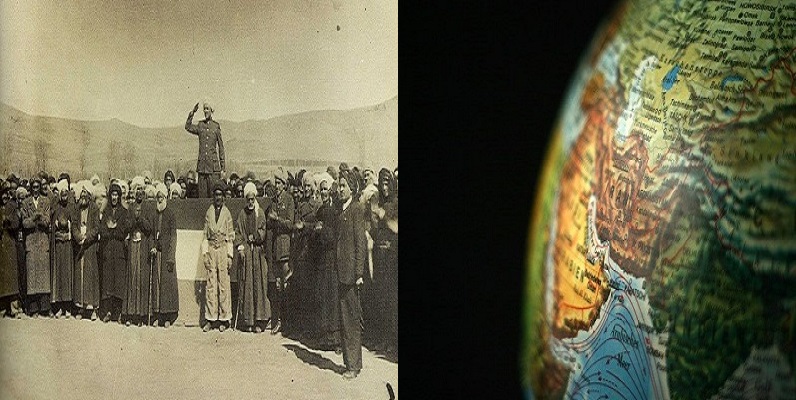Washington Kurdish Institute
By: Arash Saleh January 22, 2021
Once the cradle of civilizations, the Middle East has been, for a long time now, the bed of genocides, the den of terrorism, and the departure point of millions of immigrants. There are probably a handful of explanations on how we arrived at this point but when it comes to the question of how to deal with it, most of these explanations fall short of any practical solution that embodies universal democratic values. The easiest and most reachable answer out there has always been to let the region itself and the people there take care of their own problems. This approach could have been a perfect solution if two conditions were present: first if there already was in place a system in which different peoples were capable of exerting or practicing their agency; and second, if other world powers were on the same page with the proponents of this solution.
There is no doubt that a democratic Middle East will lead to a much better world. However, what the democracy establishment fails to understand is that the strong dislike the dominant trends in this region feel for pluralism does not allow their small play of gestures and funding to make any substantial difference. The dominant mentality in the Middle East under the long-lasting effects of Islam and old empires is accustomed to one source of authority, one source of truth, and the oneness of these two sources. Under this mentality and regardless of the form their political institutions take, the obstreperous states in this region, do not act as rational entities. They rather are hybrid devices to pursue a pre-Westphalian mission in post-Westphalian structures.
The current order that has shaped the Middle Eastern mentality over the centuries rather needs to undergo stirring and reconstructing upheavals in order to be able to construct a new mentality more conducive to pluralism. Quite contrary to the west, the region has never experienced a Westphalian moment. Instead, covert and overt agreements among Europeans such as the Sykes-Picot agreement and the Treaty of Lausanne from one side, and the remnants of the empires such as Persia and Ottoman Empire, from the other one, formed the region as we now know it. Due to the fact that nation-building has never been an endogenous process, for anyone who studies and works on the Middle East, it is imperative to be cognizant of the fact that national identity does not overlap with state borders ironically in almost all of the states whose expansionism and supremacism is the source of trouble in the region.
In almost all troublesome countries, when an observer is in a deeper level inside their societies, she or he will probably be surprised by understanding that there are no relations of belonging between states and people or citizens. Governments do not have any sense of relatedness with their people of every ethnicity and citizens don’t see themselves as owners of the state including its wealth, its resources, and its intellectual property. This situation has led to the reproduction of a set of destructive behavior and political culture that is unfathomable for western scholars and politicians.
The people of the Middle East and America have one thing in common: they both inherited this ill-structured region from the post-war European powers and the collapsing empires of the Middle East. It is time for the new administration to see the situation through this unconventional lens. If the United States needs a region that is amenable to peace and is more conducive to the spread of democratic values in the world, the Kurdish awakening is an opportunity to seize. Kurds are the element in the region that can help a significant reform in the regional order. The factor of Kurds is the only factor that creates a real challenge for the Middle Eastern mentality from within. The prevailing of the Kurdish movement will force this mentality to get accustomed to tolerance and acceptance of pluralism.
The best criterion by which we can measure if the region is on the path to democratic change is whether Kurds are acceptable as equals in the region or not. As long as this region cannot accept the fundamental rights and does not tolerate the agency of Kurds it cannot claim that it is in any finite proximity of democracy. Kurdish movement also pushes back against expansionist and supremacist nationalisms. The stronger it gets the better it will destroy the illusions these nationalisms create for their societies about going back to old glorious days. The Kurdish factor is a bulwark against the nationalisms that want to overturn the world order or to resist it.
One century of struggling with the Middle Eastern mentality has forced Kurds to be more inclined towards secular and democratic values of the west such as pluralism. It is no accident that in the heart of the Middle East and under an unprecedented volume of propaganda, the Islamic movements have never been able to infiltrate Kurdish society in a considerable way.
The Americans will be able to transform the region in a very productive way if they start to strengthen Kurdish communities in the region to be able to defend themselves and to be able to develop their society. Once these communities are on the right path and able to exert their agency, the region will start to go through serious reforms toward democracy and, in a sense, it will start to take care of itself by embracing pluralism as an organizing principle which means the existence of democratic mechanisms of relationships among nations of the region.
Arash Saleh is the Representative of the Democratic Party of Iranian Kurdistan (PDK-I) in Washington. You can reach him via arash.saleh@pdki.org.
Disclaimer: The views, opinions, and positions expressed by authors and contributors do not necessary reflect those of the WKI.

